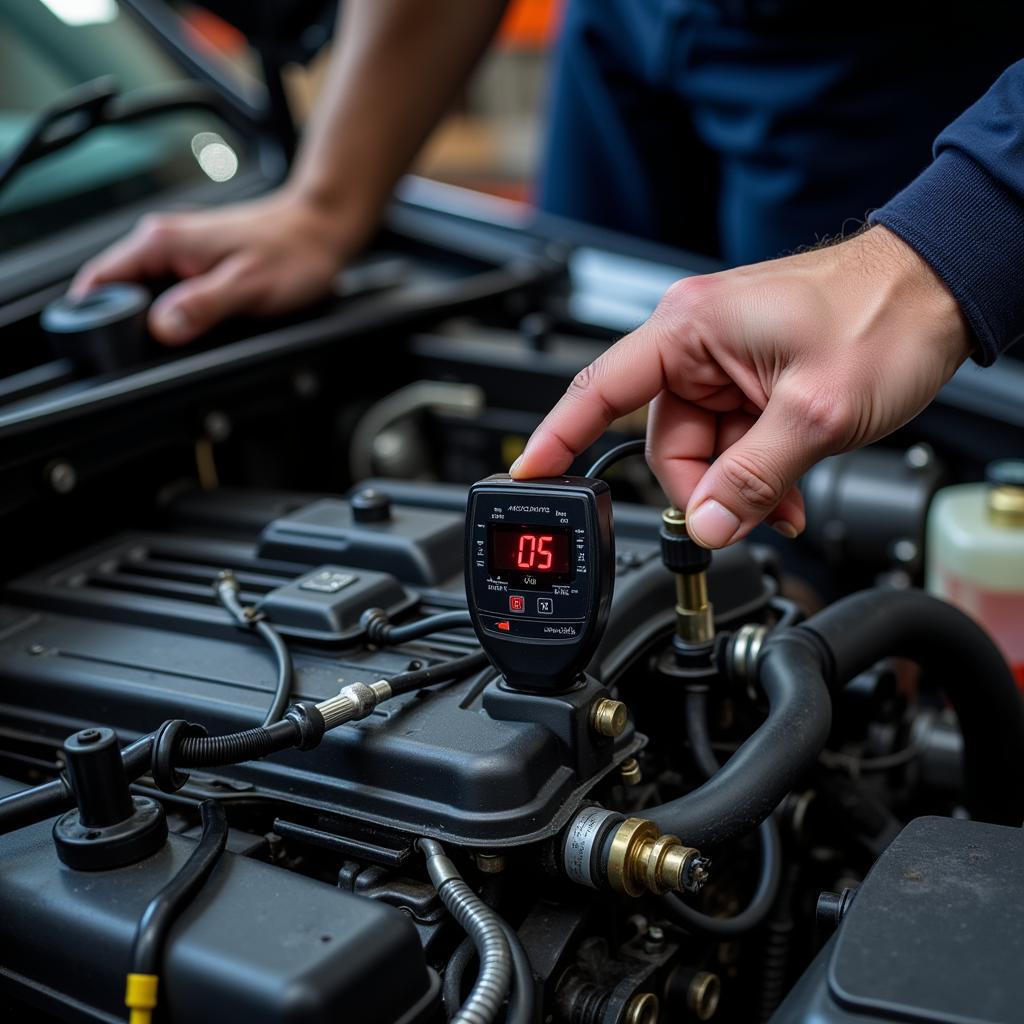Japanese cars are renowned for their reliability, fuel efficiency, and advanced technology. Whether you’re a seasoned mechanic or a DIY enthusiast, having the right tools is crucial for working on these sophisticated engines. This guide explores the essential Japanese Car Engine Tools you need for everything from routine maintenance to more complex repairs. We’ll cover everything from basic hand tools to specialized diagnostic equipment, helping you build a comprehensive toolkit for your Japanese car. You’ll find information on selecting the best tools, popular brands, and tips for effective use. Check out our guide on basic car maintenance tool kit.
Must-Have Hand Tools for Japanese Car Engines
Every mechanic, professional or amateur, needs a solid foundation of hand tools. For Japanese car engines, these are particularly important due to the often compact engine bays and intricate components. Key hand tools include:
- Metric Socket Set: Japanese cars predominantly use metric fasteners, so a comprehensive metric socket set is a must. Look for sets that include both standard and deep sockets in various sizes.
- Wrench Set: A good set of combination wrenches (with both open and closed ends) is essential for accessing hard-to-reach fasteners.
- Screwdrivers: A variety of Phillips and flathead screwdrivers in different sizes are necessary for various tasks. Consider investing in JIS (Japanese Industrial Standard) screwdrivers, which are specifically designed for Japanese screws and offer a better fit than standard Phillips screwdrivers.
- Pliers: Needle-nose pliers, slip-joint pliers, and locking pliers are invaluable for gripping, bending, and manipulating various components.
These basic tools will allow you to tackle many common maintenance tasks. For more specific repairs and diagnostics, specialized tools become necessary. Explore our recommended diy car mechanic tools.
Specialized Tools for Japanese Car Engines
Beyond the basic hand tools, several specialized tools are designed specifically for working on Japanese car engines. These tools can significantly simplify complex tasks and improve efficiency.
- Timing Light: This tool is crucial for setting ignition timing and ensuring optimal engine performance.
- Compression Tester: A compression tester measures the pressure in each cylinder, helping diagnose issues like worn piston rings or valves.
- Fuel Pressure Tester: This tool helps diagnose fuel system problems by measuring the pressure in the fuel lines.
- Vacuum Gauge: A vacuum gauge monitors engine vacuum, providing insights into various engine conditions, such as intake leaks or valve timing problems.
 Specialized Tools for Japanese Car Engines
Specialized Tools for Japanese Car Engines
Diagnostic Tools for Japanese Car Engines
Modern Japanese cars are equipped with sophisticated electronic systems that require specialized diagnostic tools. These tools allow you to read and interpret diagnostic trouble codes (DTCs), monitor sensor data, and perform various tests.
- OBD-II Scanner: An OBD-II (On-Board Diagnostics) scanner is essential for retrieving DTCs, which provide valuable clues about potential problems. Consider investing in a scan tool that offers advanced features like live data streaming and bi-directional control. Learn more about popular tool brands in japanese car.
- Multimeter: A multimeter is used to measure voltage, resistance, and current, helping diagnose electrical problems in the engine and other systems.
- Oscilloscope: An oscilloscope allows you to visualize electrical signals, providing detailed insights into sensor operation and other electronic components.
“A good OBD-II scanner is an absolute must-have for any serious DIY mechanic working on modern Japanese cars,” says Hiro Nakamura, a veteran automotive technician with over 20 years of experience. “It can save you hours of diagnostic time and help you pinpoint problems accurately.”
Choosing the Right Japanese Car Engine Tools
When choosing japanese car engine tools, quality is paramount. Investing in durable, well-made tools will ensure they last for years and provide accurate results. Consider these factors:
- Brand Reputation: Opt for reputable brands known for producing high-quality tools.
- Material and Construction: Look for tools made from durable materials like chrome vanadium steel.
- Features and Functionality: Choose tools that offer the features and functions you need for your specific applications.
- Price: While price is a factor, don’t compromise on quality for the sake of saving a few dollars.
“Investing in quality tools is an investment in your own success as a mechanic,” adds Mr. Nakamura. “Cheap tools can break easily, leading to frustration and potentially even injury.”
Maintaining Your Japanese Car Engine Tools
Proper maintenance is essential for keeping your tools in good working order. Clean your tools regularly, lubricate moving parts, and store them in a dry, organized environment.
Conclusion
Having the right japanese car engine tools is essential for performing effective maintenance and repairs. By investing in a comprehensive set of quality tools and learning how to use them properly, you can keep your Japanese car running smoothly for years to come. Whether you need a ps701 japanese car professional diagnostic tool or a car finding tool, having the right equipment is crucial.
FAQs
- What are the most essential hand tools for working on Japanese car engines?
- Why are JIS screwdrivers recommended for Japanese cars?
- What diagnostic tools are needed for modern Japanese cars?
- How can I choose high-quality engine tools?
- What are the benefits of using specialized tools for Japanese car engines?
- What are some common problems that can be diagnosed with a compression tester?
- How can I maintain my engine tools to ensure their longevity?
Need help with your car diagnostics? Contact us via WhatsApp: +1(641)206-8880, Email: [email protected] or visit us at 910 Cedar Lane, Chicago, IL 60605, USA. Our 24/7 customer support team is ready to assist you.

Leave a Reply